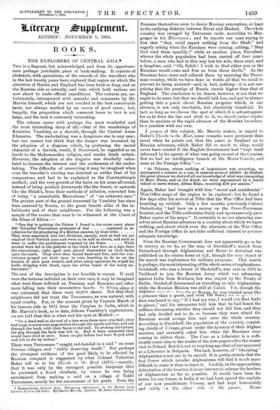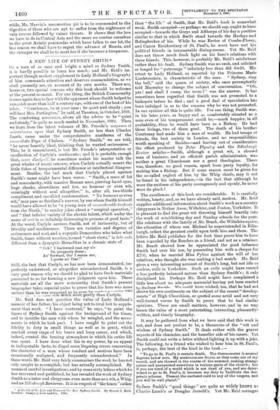BOOKS.
THE EXPLORERS OF CENTRAL ASIA.* THIS is a flagrant, but acknowledged, and from its opportune- ness perhaps justifiable, piece of book-making. It consists of abstracts, with quotations, of the records of the travellers who in the last twenty years have explored that region on which the attention of Russia and England has been fixed so long, and on the Russian side so intently, and into which both nations are now about to make official expeditions. The extracts are, un- fortunately, interspersed with remarks and comments by Mr.
Marvin himself, which are not couched in the best conceivable taste, nor always marked by an excess of good sense ; but, happily, the proportion which comment bears to text is not large, and the text is extremely interesting.
The volume opens with perhaps the most wonderful and . the most interesting story of all,—that of the wanderings of Arminius Vambery, as a dervish, through the Central Asian Khanates. The undertaking was a dangerous one in any case; but one cannot but think that the danger was increased by the adoption of a disguise which, by profaning the sacred character of a dervish, would, if discovered, be regarded as an insult to the Mahommedan religion, and render death certain. However, the adoption of the disguise was decidedly calcu- lated to increase the interest and the excitement of the under- taking. The difficulty of preserving it may be imagined when even the traveller's snoring was detected as unlike that of his companions, and had to be explained as the Constantinople method; and the very growth of the hairs on his arms all round, instead of being pointed downwards like the Sunni, or upwards like the Shiah's, from their methods of ablution, convicted him of being " a remarkable Mussnlman " of "an unknown race." The greater part of the ground traversed by Vainbery has since been annexed by Russia, to the great benefit alike of the in- habitants and of their neighbours. For the following was a sample of the scenes that were to be witnessed at the Court of the Khan of Khiva :—
" One day in quitting the Palace I found in the outer court about
300 Tchandor Tarcomans, prisoners of war captured in re- taliation for the plundering of a Khivan caravan by their tribe They were separated into two divisions, namely, such as had not yet reached their fortietb year and were to be sold as slaves, and such as were to suffer the punishment imposed by the Khan While several were led to the gallows or the block I saw how, at a sign from the executioner, eight aged men placed themselves on their backs upon the earth. They were then bound hand and foot, and the exe- cutioner gouged out their eyes, in turn kneeling to do so on the breasts of each poor wretch, and after every operation he wiped his knife, dripping with blood, upon the white beard of the hoary un- fortunate."
The rest of the description is too horrible to repeat. If such were the tortures inflicted on their own race, it may be imagined
what wore those inflicted on Persians and Russians and other races falling into their remorseless L.a.. In •Khiva alone it was estimated that there were 40,000 slaves. Not that their neighbours did not treat the Turcomans, as was natural, with
equal cruelty. For, in the account given by Captain Marsh of his famous ride in 1872 from the Caspian to India, which in Mr. Marvin's book, as in date, follows Vamb6ry's explorations, we are told that this is what met his eyes at Meshed :-
" On a dead wall at the end of a lane were three men crucified ; they had large wooden tent-pegs driven through the hands and feet, and one through the back, with their faces to the wall. To prolong the torture, the peg through the back was left in. Had it been extracted they would have died at once. Some caught before had been flayed alive and left to die by inches."
These were Tnrcomans " caught red-handed in a raid " on some Persian villages, and " richly deserving death." But perhaps
the strongest evidence of the good likely to be effected by Russian conquest is suggested by what Colonel Valentine Baker tell us in his Clouds in the East (1873),—namely, that it was only by the strongest possible language that he prevented a Kurd chieftain, by whom he was being entertained, from making a raid on a village of Tekhi Tnrcomans, merely for the amusement of his guest. Even the Reconnoitring Central Asia : Pioneering Adventures in the Region hying betteeen Russia and India. By Charles Marvin. London : W. Swan Sonnenschein.
Persians themselves seem to desire Russian annexation, at least in the outlying districts between Herat and Meshed. The whole country was ravaged by Turcoman raids, according to Mac-
gregor in his Khorassan; and he reports one man saying to him that " they could expect nothing from the Shah," and
eagerly asking when the Russians were coming, adding, " May God send them speedily ;" while at another place, Farzabad, whence the whole population had been carried off four years before, a man who had in this way lost his wife, three sons, and a daughter, said, " Oh, Sahib ! I wish to God either you or the Russians would come and free us from these devils." As the Russians have come and relieved them by annexing the Turco- man country, while we have done in words all that we could to prevent its being annexed—and, in fact, nothing—it is not sur- prising that the prestige of Russia stands higher than that of England. The conclusion to be drawn, however, is not that we ought to do more, but that we should talk less, and not be always getting into a panic about Russian progress which, in our absence, is not only inevitable, but absolutely beneficial. In fact, so long as we choose the spot at which it is advantageous for us to draw the line and stick to it, we should rather rejoice than be anxious at the rapid advance of the Russian boundary to a junction with our own.
A propos of this subject, Mr. Marvin makes, in regard to Baker's Clouds in the East, some remarks more pertinent than
usual when he points out that the panic in England as to Russian advances, which Baker did so much to allay, would never have existed if the English Government had "kept itself informed by its agents of what was going on east of the Caspian. But we had no intelligence branch at the Horse Guards, and none at the Foreign Office ":—
" At Teheran, where nothing of importance was occurring, we maintained a mission at a cost in salaries alone of £9,000. At Meshed, the point whence we derived all our knowledge of what was transpiring at Merv, Herat, and on the Atrek, we were represented by a native vakeel or news-writer, Abbas Khan, receiving £18 per annum."
Again, Baker had brought with him " secret and confidential " War-Office maps of the region to be explored; but he found a few days after his arrival at Tiflis that the War Office had been hoarding up rubbish. Only a few months previously Colonel Stebnitzsky " had been on a survey on the Perso-Turcoman
frontier, and the Tiflis authorities freely and spontaneously gave Baker copies of his maps." It certainly is no use alarming our- selves about Russian advances in a country about which we know nothing, and about which even the alarmists at the War Office and the Foreign Office do not take sufficient interest to procure adequate knowledge.
Even the Russian Government does not apparently go so far in secrecy as we do, as the map of Grodekoff's march from Samarkand through Afghanistan and Herat to Astrabad was
published on his return home at 41d., though the very object of the march was exploration for military purposes. This march is, perhaps, the most interesting of the whole series of explorations.
Grodekoff, who was a friend of Skobeleff's, was sent in 1878 to Tashkend to join the Russian Army which was advancing against India from Bokhara, but was stayed by the Treaty of Berlin. Grodekoff determined on travelling on into Afghanistan while the Russian Mission was still at Cabal. Yet, though the
Alp:tuna +n Russia, he was treated more like
a prisoner than a guest, and even the senexy . _ . door was heard to say," If I had my way, I would cut that Kafir to pieces ;" and his interpreter told him that he had heard the soldiers discussing whether they should not kill him, and they had only decided not to do so because they were afraid the Russians would avenge him and seize the whole country.
According to Grodekoff, the population of the country, consist. ing chiefly of Uzbegs, groan under the tyranny of their Afghan masters, and earnestly asked him when the Russians were coming to deliver them. The Czar as a Liberator is a suffi- ciently comic idea to the reader of the newspapers after the recent visit to Poland. But it is not so very long ago that a Czar appeared as a Liberator in Bulgaria. The task, however, of " liberating " Afghanistan is not one to be envied. It is pretty certain that the first Power which invades Afghanistan will find it much more difficult to enter it than to leave it: Luckily, in the approaching delimitation of the frontier, it is our interest to enlarge the borders of Afghanistan as far as possible. It would have been far better for our future in India if we had been spared the exploits of our now penultimate Viceroy, and had kept honourably and safely cn the other side of the passes. Mean- while, Mr. Marvin's resurrection pie is to be commended to the digestion of those who are apt to suffer from the nightmare of vain terrors followed by vainer threats. It shows that the less we have to do in Central Asia and the more we confine ourselves to the great Asiatic peninsulas which have fallen to our lot, the less reason we shall have to regret the advance of Russia, and the stronger we shall be to meet her if she becomes a trespasser.















































 Previous page
Previous page